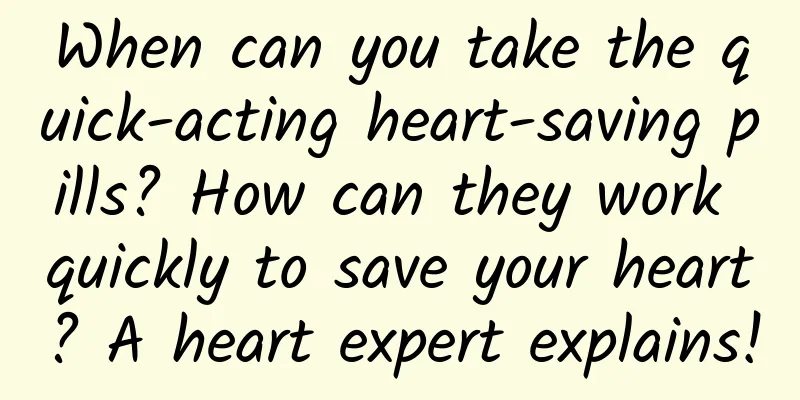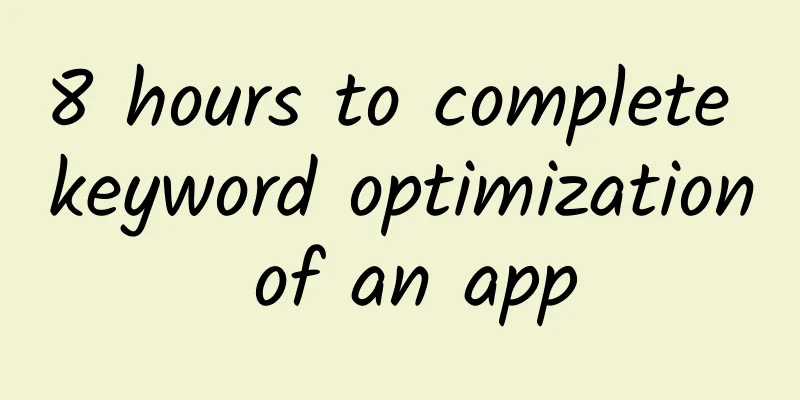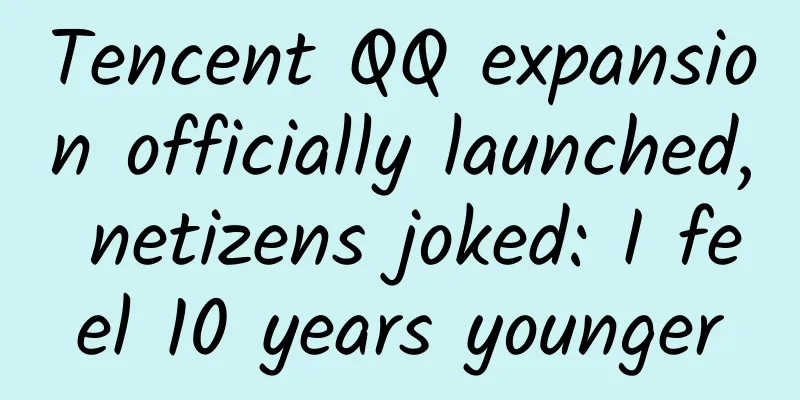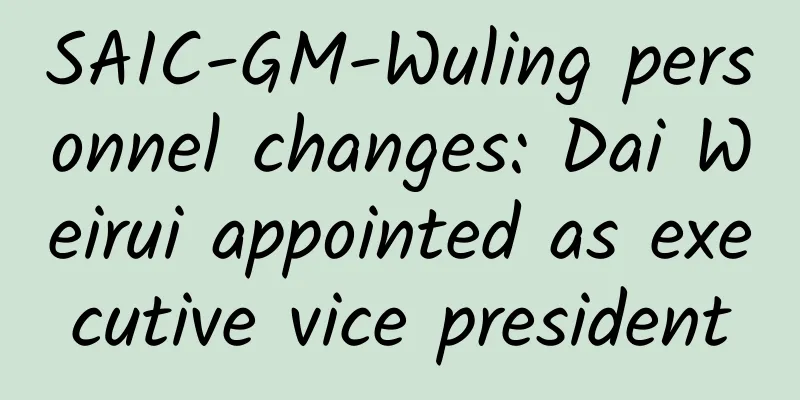When can you take the quick-acting heart-saving pills? How can they work quickly to save your heart? A heart expert explains!

|
Many heart disease patients ask me when they are in the outpatient clinic or discharged from the hospital: What emergency treatment should I use if I have a heart attack? What emergency medicine should I take? Because there are many types of heart disease, we cannot provide a single first aid plan when a heart attack occurs, nor is there a single medicine. Someone asked: Is it good to take quick-acting medicine when a heart attack occurs? Can I take quick-acting medicine at other times? I said: First of all, the instructions for the Quick-acting Heart-saving Pills say that it can promote qi and blood circulation, remove blood stasis and relieve pain, increase coronary blood flow, and relieve angina pectoris. It is used for coronary heart disease and angina pectoris of the Qi stagnation and blood stasis type. That is, the Quick-Acting Heart-Saving Pills are suitable for the treatment of coronary heart disease and are used to relieve angina pectoris. So when angina pectoris attacks, can you take quick-acting heart-saving pills? According to the instructions, of course it can be sublingual, and this medicine is taken sublingually when suffering from angina pectoris caused by coronary heart disease; The Quick-Acting Heart-Saving Pills were launched in 1981 and are deeply loved by patients. The main ingredients of the Quick-Acting Heart-Saving Pills are Chuanxiong and borneol. Chuanxiong has the effects of promoting qi and relieving depression, promoting blood circulation and relieving pain, while borneol has the effects of invigorating the mind, removing filth and clearing turbidity. The two medicines complement each other and can be used to treat qi stagnation and blood stasis type coronary heart disease, and angina pectoris. The quick-acting heart-saving pills have the effects of dilating coronary arteries, relaxing vascular smooth muscles, resisting myocardial ischemia, protecting myocardial cells, inhibiting the formation of atherosclerotic arteries, reducing blood viscosity and having significant antispasmodic and analgesic effects. It is called the "life-saving medicine" for coronary heart disease and is as famous as the Western medicine nitroglycerin! However, in actual clinical practice, as long as the patient has clear coronary heart disease or angina pectoris, we generally recommend that the patient carry nitroglycerin instead of quick-acting heart-saving pills. At least quick-acting heart-saving pills are not the first choice. We know that angina pectoris is a manifestation of myocardial ischemia in severe cases of coronary heart disease, especially unstable angina pectoris, which carries the risk of cardiac arrest and the risk of developing acute myocardial infarction. Therefore, when angina pectoris occurs, we must find a way to stop the attack. The current standard for judging whether drugs for treating angina pectoris are effective is: 1. Marked effect: Generally, angina pectoris disappears or is basically relieved within 3 minutes after taking the medicine. 2. Effective: Angina pectoris disappears or is basically relieved 3 to 5 minutes after taking the medicine. 3. Ineffectiveness: Angina pectoris gradually eases or does not improve more than 5 minutes after medication. In other words, the best standard for judging whether the drug is effective is within 3 minutes, 3-5 minutes is also acceptable, and if it exceeds 5 minutes, it means the drug is ineffective. Current research shows that nitroglycerin is effective for 93% of angina pectoris, so when angina pectoris occurs, we prefer nitroglycerin. As for the Quick-acting Heart-saving Pills, there is no data in this regard, but it is not impossible to contain it, after all, the instructions say that it is suitable for angina pectoris. But everyone must be clear that only when the emergency medicine is relieved in about 3 minutes after taking it in mouth, it can be said to be an emergency medicine. Some people often take more than 10 minutes to get relief after taking the so-called emergency medicine, which means that this medicine is not an emergency medicine. Because angina pectoris usually lasts for 3-15 minutes, and the longest is 15 minutes. If it takes more than 5 minutes to get relief, it is not the effect of the medicine. So don’t make the mistake of thinking that if you take a certain medicine and it gets better in 10 minutes or half an hour, you think it is a good medicine. In fact, it is not! So in what cases is it recommended to use the Quick-Acting Heart-Saving Pill? On the one hand, we only recommend that nitroglycerin be used first, because both clinical and big data have proven that nitroglycerin can relieve angina pectoris at the fastest speed. But on the other hand, we have no right to say that the quick-acting pill has no effect. The most important thing is that when nitroglycerin cannot be used, using the Quick-Acting Heart-Saving Pill becomes the only choice. In what situations can nitroglycerin not be used: 1. Severe anemia; 2. Glaucoma; 3. Increased intracranial pressure; 4. Patients allergic to nitroglycerin; 5. Hypertrophic obstructive cardiomyopathy; 6. Hypotension; When angina pectoris occurs in the above-mentioned situations, you can only take quick-acting heart-saving pills. Another problem is that the instructions for nitroglycerin and quick-acting heart-saving pills both recommend that they be taken sublingually when angina pectoris occurs, that is, for emergency treatment. In other words, it is not recommended to take them sublingually when you are uncomfortable or do not have clear angina pectoris, especially nitroglycerin, which should not be taken sublingually. However, the prescription of Suxiao Jiuxin Pills is not so strict. Many people have taken Suxiao Jiuxin Pills when they feel panic, shortness of breath, or other discomforts. Regardless of whether it works or not, it at least gives people psychological comfort that they have taken the medicine. The instructions also recommend that you can take it on a regular basis, so you can take Suxiao Jiuxin Pills occasionally. If you have angina: 1. Take 1 tablet of nitroglycerin sublingually. If there is no obvious relief, or angina pectoris reappears after relief, you can continue to take it sublingually. If 2-3 tablets are ineffective, it is not recommended to continue taking it sublingually because it can cause hypotension. Moreover, if it is ineffective after taking it sublingually, there is no benefit in taking more sublingually. 2. Oral administration, 4-6 tablets at a time, 3 times a day; in case of acute attack, 10-15 tablets at a time. That is, when there is no attack, 4-6 tablets at a time, 3 times a day as a regular medicine; in case of emergency, 10-15 tablets at a time. But as I said above, for clear angina pectoris caused by coronary heart disease, nitroglycerin is recommended as the first choice. Key questions: Whether nitroglycerin or quick-acting heart-saving pills are effective, it means that angina pectoris has already occurred. Every angina pectoris is an alarm from the heart. You need to go to the hospital and adjust the treatment. Only after the entire treatment, the angina pectoris is under control and there will be no angina pectoris in the future, which means that the angina pectoris is stable. Otherwise, relying on emergency medicine will sooner or later cause trouble. Emergency medicine can only be used for emergency treatment, and there is no other way! |
<<: A 'hidden' symmetry found in watermelon could open up new avenues for metamaterial design
>>: What are the parts of crayfish that you cannot eat? The shrimp thread, the shrimp roe, or...
Recommend
Xiaohongshu keyword ranking strategy!
|Directory| 1. Xiaohongshu search ranking 2. The ...
Is the fee to join the Qujing Designated Driver Mini Program high? Qujing Designated Driver Mini Program Franchise Fees and Process
What is the price to join the Qujing Designated D...
How to give a mini program a “good name”?
Q: How to give a mini program a “good name”? A: N...
People always say that iPhone runs smoothly without any lag, but Android runs very laggy?
When buying a mobile phone, the most common advic...
5 steps to quickly write high-conversion information flow advertising copy
Many friends often complain to me: " Informa...
Detailed explanation of iOS APP architecture design
iOS APP Architecture Design 1. Overview of APP Ar...
my country will experience the most complicated Spring Festival travel weather since 2008, so please be careful when traveling back home!
The Central Meteorological Observatory predicts t...
How to improve product stickiness and reduce user churn rate?
The Internet has entered the second half today. U...
How to do user operation? Share 5 points!
one In July, I attended an operations -related co...
"Hydrogen" doing its best? Where does the strange acceleration of interstellar comet "Oumuamua" come from?
Interstellar Comet 'Oumuamua Has a Weird Acce...
Ground combat robots: Has the era of collaborative combat between humans and robots arrived?
Recently, according to Russian media reports, the...
WeChat iOS 7.0.12 is officially launched, dark mode is here
WeChat version 7.0.12 is officially launched. Aft...
Reliable recommendations for drinking and tasting tea in Changsha: Sharing the most cost-effective places in Changsha! Studio Arrangement
Reliable recommendation for drinking tea in Chang...
Zhao, Qian, Sun, Li, Zhou, Wu, Zheng, Wang...How did these surnames come about?
Who am I? Where do I come from? Leaving aside the...
The lurking supporter Yao Mei "Main lifting and detonation actual combat special training camp" 1st issue
Lurking Family Yaomei "Main Lifting and Deto...









